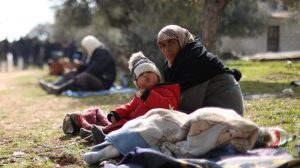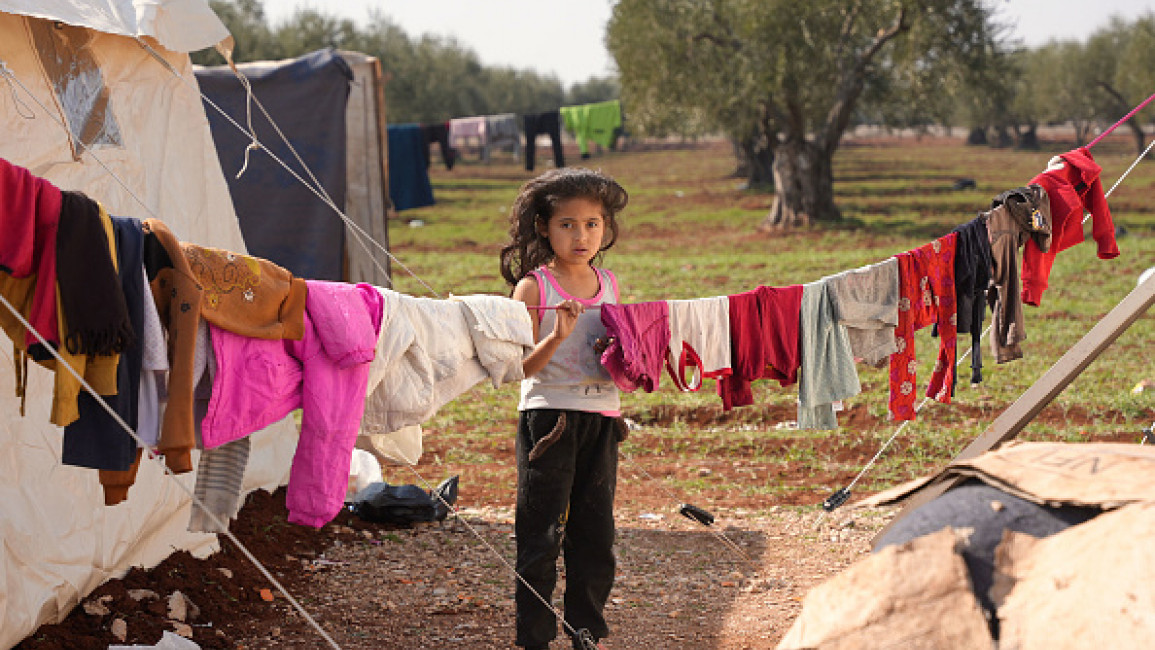The World Health Organization said on Wednesday it was particularly concerned over the welfare of people in northwestern Syria, an opposition-held region with little access to aid since the earthquakes struck last week.
“It’s clear that the zone of greatest concern at the moment is the area of northwestern Syria,” WHO’s emergencies director, Mike Ryan, told a briefing in Geneva.
“The impact of the earthquake in areas of Syria controlled by the government is significant, but the services are there and there is access to those people. We have to remember here that in Syria, we’ve had ten years of war. The health system is amazingly fragile. People have been through hell.”
Efforts to distribute aid have been hampered by a war that has splintered the country for more than a decade. War enmities have obstructed at least two attempts to send aid across frontlines into Syria’s northwest, but an aid convoy reached the area overnight.
During a visit to Damascus in the wake of last Monday’s quakes, senior WHO officials asked Syrian President Bashar al-Assad to open more border crossings with Türkiye to ensure aid reaches the area, WHO Director General Tedros Adhanom Ghebreyesus said on Wednesday.
Red Cross
In the meantime, the Red Cross more than tripled its emergency funding appeal to over $700 million for aid to victims of the catastrophic earthquake that struck Turkey and Syria last week.
The International Federation of the Red Cross and Red Crescent Societies said it now estimated it would need 650 million Swiss francs ($702 million) to help respond to the soaring humanitarian needs in both countries.
Just over a week ago, the organization had estimated its funding needs at 200 million francs.
UK takes steps to further facilitate aid flow into Syria
Following the footsteps of Washington, the UK has issued two General Licences, building on existing humanitarian provisions, to further facilitate humanitarian relief efforts in Syria following last week’s earthquakes.
These Licenses will strengthen the timely and effective delivery of relief efforts by removing the need for individual license applications.
The UK remains committed to holding the Assad regime accountable, including through comprehensive sanctions regulations, for its heinous crimes against the Syrian people.
The UK is taking steps to make it easier for aid agencies to operate in Syria without breaching the sanctions that target Assad’s regime. These Sanctions General Licences will further facilitate earthquake relief efforts in Syria.
The UK’s sanctions regulations already contain robust provisions for humanitarian efforts. The Office of Financial Sanctions Implementation (OFSI) is acting to further facilitate relief efforts in Syria by issuing a General Licence. The General License will authorize activities which would otherwise have been prohibited by the asset freeze for specified groups or organisations, and their service providers.
The Export Control Joint Unit’s (ECJU) General Licence will extend the protection offered by the current humanitarian exception to petroleum prohibitions for UK-funded persons to all those conducting earthquake relief efforts in Syria and Turkey. This covers persons delivering the specified activities and their service providers.
Earthquake developments
In both regime-held and opposition areas of Syria, individuals reported difficulty procuring infant formula after the devastating earthquake left over 42,000 dead and up to 5.3 million homeless.
Aleppo hospitals overwhelmed by victims
Hospitals in Aleppo do not have enough room for new patients in the wake of last week’s devastating earthquake, a doctor in the Syrian city has told the BBC.
At the Al-Razi Hospital, there are too many beds to fit into the wards. They reach end-to-end through corridors and into the chilly courtyard.
“We couldn’t discharge patients from the hospitals even after treating them. The city is damaged and there are no places for them to go,” said Dr. Nizar Suleiman, the head of orthopedics.
“Huge numbers of patients came in a short period. We have a huge shortage in medicines, so it’s really worrying.
“For example, we suffer from a lack of medical equipment to treat fractures. We already suffer from this shortage because of the crisis, and the siege [sanctions] make it worse.”
More than 4,400 deaths and 7,600 injuries have been reported in north-western Syria since a 7.8-magnitude earthquake struck neighbouring southern Turkey on 6 February, according to the UN.
The damage to Aleppo is widespread. The BBC was given a rare opportunity by the Syrian government to visit there and speak to medical workers.
Tens of thousands of people are now living in churches, mosques or in public spaces and parks after losing their homes.
They told us that during the country’s civil war, which has been going on for more than a decade, they had almost expected to lose loved ones or property.
But the earthquake was so unexpected. It struck while they slept, bringing a fresh wave of suffering that they felt was somehow even harder to bear.
The government says its aid effort has been hampered by the economic sanctions that Western powers imposed in response to alleged human rights violations and other abuses committed during the country’s 12-year civil war.
The US, UK and EU deny this, saying trade in essential goods and humanitarian assistance are exempt from the sanctions.
Infant formula shortage in Syria, exacerbated by devastating earthquake
Nursing mothers are struggling to find infant formula in Syria after the February 6th earthquake exacerbated existing shortages in the country, risking long-term harm to young children.
“There is a great demand for baby milk: most of those affected by the earthquake were children who lost their families and needed to at least secure food,” Fatima (a pseudonym), who is sourcing and distributing infant formula for needy families in Damascus, told The New Arab.

The WHO and UNICEF warned on 12 February that there was an acute risk to infants and young children of breastfeeding age in the quake’s aftermath and urged immediate international intervention.
“During such emergencies, the importance of breastfeeding and increase of … mortality risks associated with no breastfeeding are more pronounced,” the joint statement said.
Three sources – two in Latakia and one in Damascus – said that even in emergency relief shelters for earthquake victims, there is not enough infant formula.
UNICEF is currently assessing to see if there is a shortage of infant formula in northwest Syria and has begun procuring supplies for breastfeeding mothers and infants.
“If our assessments show that there is any shortage of infant formula, UNICEF will procure formula … prioritising infants under six months,” Ammar Ammar, the regional chief of advocacy and communication for UNICEF Middle East, told TNA.
Syrian migrants sending back millions in aid following devastating earthquake
Syrian migrants have mobilized to help their country following last week’s powerful earthquake, sending financial aid to those desperately in need.
Most Syrian migrants have “carried the wounds of their families and carried their burdens,” Radi Saad of the White Helmets told Al-Araby Al-Jadeed.
He said large donations had arrived from Syrians and non-Syrians abroad.
The White Helmets is Syria’s Civil Defence in opposition-held areas. They announced an official mourning period earlier this week.
Saad expressed regret at the “abandonment” of the United Nations, decrying the UN’s need to get the approval of the regime before sending aid to afflicted areas.
He thanked Syrian expats for stepping in at such a crucial time, saying “the assistance of Syrians at home and abroad is more than what we’ve received in international assistance.”
One such campaign was organized by Syrians in Germany under the name “A small amount makes a difference.” Germany hosts one of the largest Syrian refugee communities in Europe.
Donations in Saudi Arabia exceeded $100 million, according to Mustafa Saleh, a Syrian resident in Jeddah. He told Al-Araby Al-Jadeed that over a million people donated to the campaign there.
Millions of dollars more have been collected in other Gulf countries.
Donations are not arriving in only rebel-held zones in Syria’s northwest Idlib province. Money is also being sent to regime-held regions, such as Aleppo, Latakia and Hama, also largely affected by the earthquake.
Syrian economist Hussein Jamil estimates that a “minimum” of $5 million is being sent to regime-controlled areas.
HTS Seizes 4 Relief Aid Trucks In Aleppo’s Jindires
On Wednesday, Hayat Tahrir al-Sham (HTS, formerly al-Nusra Front) seized four trucks, onboard relief aid sent by Arab tribes in north and east Syria, in the town of Jindires in the countryside of Aleppo. The extremist group transported the aid to the city of al-Dana in the countryside of Idlib.
The town of Jindires witnessed tension between the HTS and Jaysh al-Sharqiya, affiliated to the Turkish-backed Syrian National Army (SNA), on the background of aid arriving in the area amid accusations of looting and enforced confiscation.
The tension between the two sides rose following the arrival of an aid convoy from Deir ez-Zor where Jaysh al-Sharqiya prevented HTS general apparatus from running the convoy, a source told North Press.
A source told North Press that HTS increased its presence in Jindires, installed security checkpoints in the area, and started monitoring and checking trucks that arrived in the area, pushing Jaysh al-Sharqiya to warn HTS’ apparatus not to meddle in aid as it is the controlling force in the area.
On the government part
The government is continuing its disaster diplomacy to get out of the suffocating siege it had been subject to.
President Bashar Al-Assad received a message from the Iraqi Prime Minister, Mohammad Shia al-Sudani, conveyed by Faleh al-Fayadh, Head of the Popular Mobilization Forces (PMF) in Iraq, in which he offered his sincere condolences to his Excellency, and to the Syrian people over the victims of the devastating earthquake.
In the message, al-Sudani also stressed that Iraq will continue to support the efforts of the Syrian government with all its capabilities in order to alleviate the repercussions of the earthquake on the Syrians.
President al-Assad thanked Iraq’s positions on the official and popular levels, and the speed of response it made towards Syria, considering that the blood and brotherhood ties between the Syrian and Iraqi peoples, and the common challenges they faced at different stages made them always close to each other exchanging support and assistance as they are fully aware that what befalls one country affects the other one.
UNFPA
Foreign and Expatriates Minister Dr. Faisal a-Mekdad, Regional Director of United Nations Population Fund in Arab Countries (UNFPA), Laila Baker, and the accompanying delegation, discussed Thursday cooperation between the Population Fund and various parties in Syria, especially regarding the repercussions of the earthquake hit Syria last week.
During the meeting, Baker offered her condolences to Syria and to the families of the victims of the devastating earthquake, asserting that the United Nations Population Fund will exert all possible efforts to provide assistance to the affected regions.
In turn, Minister Mikdad pointed out to the negative effects of the unilateral coercive measures imposed on the country, which prevented the Syrians from securing the necessary equipment to confront this humanitarian catastrophe.
Mikdad stressed the keenness of the Syrian Government to deliver humanitarian aid to all Syrians across the entire Syrian territory.
Planes arrive at Lattakia International Airport
Three planes arrived at Lattakia International Airport on Thursday, two of them from the Republic of Chechnya and the third one from the UAE.
The Three planes carry relief aid for those affected by the earthquake that hit Syria last week.
“Upon directives of the Chechen President, we have collected aid for the Syrian people to face the repercussions of the earthquake,” the head of the Chechen delegation accompanying the two planes, Osman Usmanov, said.
Usmanov added that the two planes carried 98 tons of relief materials, including clothes, tents, blankets, baby food, powdered milk, electricity generators and lighting devices.


